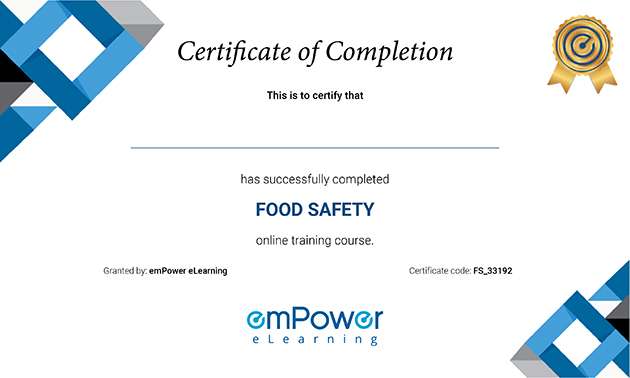Complete Food Handling Certificate & Training Course For Workers
Boost Your Career. Acquire Vital Skills through Our Food Handling Certificate Training. Begin Now for a Safer journey in the restaurant and Hospitality industry!

Our Client

































What is Food Handler
Elevate your expertise in food safety and service with our comprehensive food Certificate program. The training is designed to equip you with essential skills and knowledge for working safely as food handlers in restaurants, hotels, or any other food service location.
The purpose of this training is to help you understand the food-handler regulations for California, and to provide you with the knowledge and skills mentioned above. By the end of this course, you’ll be able to identify foodborne illnesses, recognize potentially hazardous food, and how to prevent contamination, and learn about implementing proper hygiene at the workplace.
Taking our food handling certificate course can help you gain a competitive edge, enhance your credibility, and bolster your commitment to creating a food-safe environment.
Embark on this learning venture today, and open doors to new opportunities within the restaurant and hospitality sector. Join us to cultivate skills that last a lifetime, prioritize safety, and build a thriving career in the world of food service.
Course Description
| Category | Food Safety |
| Course Name | Food Handler |
| Duration | 30 mins |
| Certificate Included | Yes |
| Languages | English |
| Course Type | Interactive online training |
| Narration | Yes |
| Format | LM-light, SCORM 1.2 |
| Supported Devices | Desktop/Laptop, Tablet, Phone |
| Last Updated | June 30, 2021 |
What you’ll learn
By the end of the food handling certificate training, you’ll be able to:
- Identify illnesses that could be associated with food.
- Recognize potentially hazardous foods, and chemical, biological, and physical contamination of food.
- Understand the relationship between time and temperature with respect to food safety.
- Describe methods for preventing food contamination during all stages of food handling, including storage and purchasing.
- Implement proper hygiene in the workplace.
- Identify and apply correct procedures for cleaning and sanitizing equipment and utensils.
- Implement housekeeping practices that promote cleanliness and safety in the workplace.
Curriculum
- Basic Food Safety
- Scope and Conduct of Food Safety Inspections
- What is Food borne Illness?
- What is contamination?
- How Food Contamination Occurs?
- Types of Food Contamination
- How Food Contamination Spreads?
- How to Stop Food borne Illnesses?
- Proper Food Handling – Receiving and Storage
- Food safety when purchasing and receiving food items
- How to store food
- How to keep your storage area safe?
- Proper Food Storage Methods
- Importance of Food Preservation
- Techniques of Food Preservation
- What is Time-temperature Control?
- What are Potentially Hazardous Foods?
- What is Cross Contamination?
- Preventing Time-Temperature Abuse
- Monitoring Time and Temperature
- Proper Food Preparation
- The Basic Sequence of Food Preparation
- Hot and Cold Holding
- How to Cool Food Safely
- How to reheat food safely?
- Precautions to take when serving food
- Precautions to take when Re-serving Food
- Self Service and off-Site Service
- Importance of Good Hygiene
- Good Hygiene Practices
- Proper hand washing methods
- How to use gloves?
- How to deal with employee sickness
- Cleaning and Sanitation
- Using Sanitizers and detergents
- The Process of Cleaning and Sanitizing
- Food and Trash Disposal
- General Cleaning
- Signs of a Pest Problem
- Pests can Spread Diseases
- Why Do You Need Pest Control?
- How to Control Pests?
Who Should Attend?
Food handling training is essential for anyone working in the food industry, especially those who directly handle, prepare, or serve food. This includes:
- Restaurant staff
- Catering personal
- Food servers
- Institutional food workers
- Food truck operators
Why emPower
100s of customers
- 14+ Years of experience in working with small to large businesses from different industries
- 95% customer retention
Customer Experience
- 24x7 dedicated support and toll free number
- 99%+ guaranteed uptime
Extremely Cost-effective
- As low as $0.99/user/yr
- We will match or better the price of your current LMS
Effective Courses
- Each course is 20-40 min long to ensure engagement with quizzes and certificate
- SCORM 1.2 Compliant
Implementation
- No setup costs
- We deploy your customized solution in less than 48 hours
Our Achievements
Here you can review some statistics about our Education Center
Start Your Certification Course Today
Food handler’s license costs vary in Texas but typically range from $7 to $20. Prices may differ based on the county and the specific training provider chosen for the required food safety course.
Yes, in New York City, food handlers are required to obtain a Food Protection Certificate by completing an approved food safety course and passing an exam to ensure safe food handling practices.
Within 30 days of employment, individuals in Tennessee engaged in food preparation or service, such as chefs, cooks, servers, baristas, and bartenders, must obtain a Food Handler’s license. Not all roles, like bussers and general managers, may necessitate this requirement.
The NYC Food Protection Course is typically around 15 hours in duration, including classroom instruction and an exam, covering essential food safety practices for food handlers in the city.

